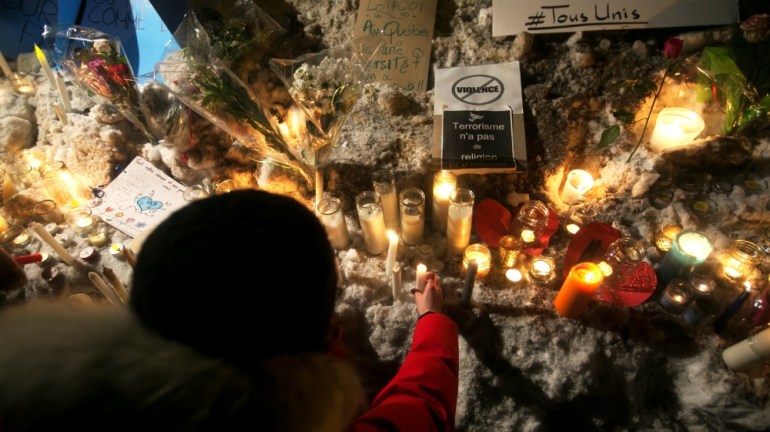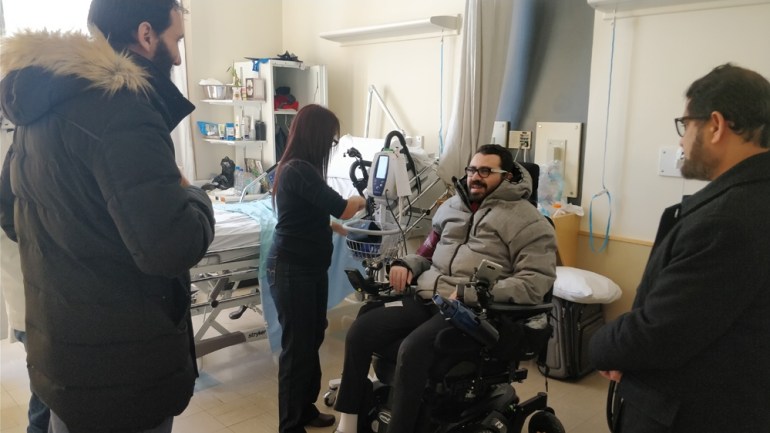Quebec mosque attack ‘hero’ recalls life-changing moments
Aymen Derbali was shot seven times in 2017 assault on a Canadian mosque as he ran towards the gunman to protect others.

Quebec City, Canada – Aymen Derbali says he would make the same fateful decision today that he made five years ago.
The father of three had just finished praying at the Quebec Islamic Cultural Centre on January 29, 2017, when he heard loud bangs outside. Moments later, the once-peaceful mosque turned into a scene of terror, with dozens of worshippers desperately seeking cover as a gunman began firing into the prayer room.
Keep reading
list of 4 items‘It’s a weapon of war; not a toy or hunting rifle’
Canada’s Quebec bans religious symbols in some public sector jobs
Four years after Quebec mosque attack, a promise ‘not to forget’
In less than two minutes, six men would be dead, five others – including Derbali – would be seriously injured, and Muslim communities across Canada would be left deeply shaken.
But as the scene unfolded that night, Derbali – who found himself between the shooter and the crowd – had only a split second to make a decision. “When I saw the panic behind me … I said to myself, ‘I have to stop him. He can’t be allowed to move forward.'”
So Derbali waited for a brief pause in the assault and then ran towards the gunman. He was shot seven times, including a bullet that hit his spinal cord and rendered him paralysed from the chest down.
“What brings me the most comfort is that I tried to do something, I tried to save people. I was shot, but he could have used those bullets to kill other people,” the now-45-year-old tells Al Jazeera in an interview at his home in advance of the five-year anniversary of the attack.
“I was shot seven times, it’s not easy – but that’s seven fewer bullets for the others.”
‘Physical and mental suffering’
Alexandre Bissonnette fired 48 shots during his deadly rampage inside Quebec City’s largest mosque. Many, including the gunman, believed Derbali would be among the fatalities, as he fell unconscious on the prayer room floor wounded in the leg, stomach and arm.
But he was rushed to hospital and survived, later being hailed as a “hero” and awarded for the bravery he showed on that cold winter night in 2017.
Six Muslim men ultimately were killed in the attack: Azzeddine Soufiane, Aboubaker Thabti, Khaled Belkacemi, Abdelkrim Hassane, Ibrahima Barry and Mamadou Tanou Barry were husbands, fathers, and friends – and their deaths have left gaping holes in the tight-knit community.
Dozens of survivors also continue to shoulder lasting trauma, as mental and physical scars serve as daily reminders of what happened. “It’s difficult because when I think about it, it’s been five years that I lost all my capabilities – five years of physical and mental suffering,” said Derbali.
After spending two months in a coma, five and a half months in intensive care, and 13 months at a physical rehabilitation centre including learning how to adapt to a wheelchair, he was able to go home to his family.
He said doctors told his wife while he was in the coma that she should take him off life support because he would likely lose his memory – and be unable to recognise his loved ones – and also could be paralysed from the neck down.
But when he regained consciousness, he remembered everything and could move his arms.
“The biggest challenge is trying to gain a bit of dexterity, to be able to do small things. I can’t even close my fingers,” he told Al Jazeera from his brightly decorated living room, trying to squeeze one of his hands shut.
If the bullet that pierced his spine had been a few millimetres higher, Derbali said he “wouldn’t have the use of my arms” – only his head. “I consider myself very lucky, anyway.”
Inspiring others
A native of Tunisia, Derbali came to Quebec in 2001 to study for an MBA at Universite Laval.
An IT consultant, he worked with Oxfam-Quebec in Bolivia for a few years before returning to Quebec City. In 2010, he founded a charity that provides humanitarian aid primarily in Palestine, including support for Palestinian orphans in the Gaza Strip. He continues that work today.
Derbali has also continued to undergo physical therapy as he adapts to a new life with limited mobility. His youngest child, a daughter who was an infant when the shooting took place, has only really known him in a wheelchair, he said.
But his perseverance is clear, as he uses his mobile phone to turn on lights and adeptly moves around his home. In the five years since the attack, that resilience has helped other survivors cope with their own trauma, as well.

Hakim Chambaz, who survived the assault and saved the life of a young girl by shielding her behind a post as the shots rang out, said seeing Derbali continue to speak about his experience gives him the courage to do the same.
In 2020, Canada’s governor general awarded Derbali and Chambaz, as well as two other attack survivors and Soufiane, one of the men fatally shot, with medals of bravery for intervening during the shooting.
“When I see Aymen and I see the other brothers who were also shot, it encourages me, too,” Chambaz told Al Jazeera. “He suffered so much and he is still there – so why should I take a step back? We’re here and we’re doing our best to make sure that this event never happens again in Quebec.”
Islamophobia
The Muslim community in Quebec City has rallied around the families of the victims and the survivors, especially as painful details of the shooting emerged during Bissonnette’s sentencing hearings.
The Quebec City man pleaded guilty to six counts of first-degree murder and six counts of attempted murder, and was sentenced to life in prison without the possibility of parole before 40 years. An appeals court later bumped his parole ineligibility down to 25 years, but that is being challenged in the Supreme Court of Canada, which is expected to hear the case later this year.
Meanwhile, people across Canada have collected funds to help community members rebuild their lives, including $310,000 (400,000 Canadian dollars) raised for Derbali in 2018 to allow him and his family to move into a home better adapted to his needs.

But Derbali said he sometimes is kept up at night by fears he could be targeted again – and would not be able to protect himself and his family. “If someone attacks us, I can’t act, I can’t do anything. I can’t protect myself, I can’t protect my family,” he said.
The key to preventing acts of violence like the one that took place at the Quebec City mosque, Derbali told Al Jazeera, is to address the issue at the heart of the attack: Islamophobia.
He welcomed the Canadian government’s decision to designate January 29 as the National Day of Remembrance of the Quebec City Mosque Attack and Action Against Islamophobia, but said more work needs to be done, especially in terms of education.
He pointed to the presence of far-right groups, incendiary reporting by local media, and the provincial premier’s refusal to clearly acknowledge that Islamophobia exists in Quebec, as obstacles in the fight to end ignorance and hatred.
“What happened [at the mosque] is an isolated case, it doesn’t reflect the real hospitality and openness of Canadians,” Derbali said. “But it’s a shocking event that made us wake up to the fact that Islamophobia exists and we need to fight against [it].”